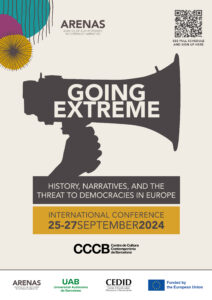The Autonomous University of Barcelona will host an international conference next September to address some key topics of the ARENAS project. Going Extreme: History, Narratives and the Threat to Democracies in Europe will be held at the Center de Cultura Contemporània de Barcelona (CCCB) from September 25th – 27th.
 In recent years, extremist narratives are increasingly having a relevant impact on our societies. In a context that has been correctly defined as a polycrisis, the spread of these narratives represents a serious threat to democratic values and, possibly, in the long term, to the survival of liberal and pluralist democracies. It is consequently necessary to understand more in-depth how extremist narratives arise, how they are transformed and how they circulate.
In recent years, extremist narratives are increasingly having a relevant impact on our societies. In a context that has been correctly defined as a polycrisis, the spread of these narratives represents a serious threat to democratic values and, possibly, in the long term, to the survival of liberal and pluralist democracies. It is consequently necessary to understand more in-depth how extremist narratives arise, how they are transformed and how they circulate.
What are the historical roots of the main extremist narratives currently circulating in Europe? How have they transformed over the last century? How have they been adapted to different historical and national contexts? How do they circulate and how are they disseminated in the present time in the political space and the media?
These questions will be addressed during the three days of the conference. The event will open on the afternoon of September 25 with an inaugural debate on democracy, youth and extremism in which the Minister of Youth and Children of the Government of Spain, Sira Rego, the former Minister of Universities of the Government of Spain, Joan Subirats, and the journalist of El País Milagros Pérez Oliva will participate.
On September 26 and 27, the congress will be developed around three thematic axes: nation, gender and science. In each of them, there will be a conference and a round table in which specialists from different European countries will participate, such as, among others, Sara Farris, Alejandro Quiroga and Camil Ungureanu.
One of the main objectives of the ARENAS project is not only to analyse the characteristics and impact of extremist narratives in Europe, but also to counteract their spread, promoting constructive dialogue and offering concrete solutions and tools to the various social agents to strengthen our democracies. This conference is the first step of research work that will be carried out until spring 2027 and involves twelve partners, both academic and civil society, in nine European countries.
Learn more about the schedule and speakers and register for the event here
